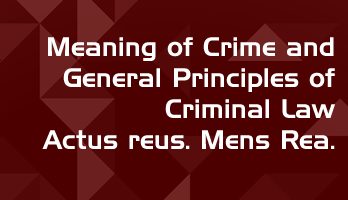Free Full Course Available on LawMint's YouTube Channel
How to Land Your Dream LLB Internship in a Top Law Firm
- Part 1 - Introduction
- Part 2 - Internship Planning
- Part 3 - Internship Research
- Part 4 - Building Your Profile
- Part 5 - The Email
- Part 6 - The Resume
- Part 7 - The Cover Letter
- Part 8 - The Interview
- Part 9 - Self Development
Practical and comprehensive course, with real examples and step-by-step analysis of the complete internship application process. Check out LawMint's YouTube channel now!
Types, Techniques and Theories of Punishments
The Techniques of law and remedies are based on the famous dictum, “for every distinct offence of which any person is accused there shall be a separate charge, and every such charge shall be tried separately”.
The types of punishments are based on the various theories of punishments. These are as follows:
Deterrent Theory
A punishment is primarily deterrent when its object is to show the futility of crime and thereby teach a lesson to others.
The philosophy behind this theory and type of punishment is to give a clear message that “a crime is an ill bargain to the offender”. Thus, followers of this theory advocates capital punishments to the offenders.
Criticism of Deterrent Theory
This theory has been criticized on the grounds that it has proved ineffective in checking crimes and also that excessive harshness of punishment tends to defeat its own purpose by arousing the sympathy of the public towards those who are given cruel and inhuman punishment.
Moreover, critics contend that hardened criminals may not be deterred by the punishment, making this an ineffective theory.
Preventive Theory
This Theory aims to disable the wrong-doer and creating a fear of punishment in the mind of the wrong doer. This Theory works in the following three ways:
- By inspiring all perspective wrong doers with the fear of punishment;
- By disabling the wrong doer from immediately committing any crime;
- By transforming the offender by a process of reformation and re–education, so that he/she would not commit crime again.
Some of the punishments advocated by the followers of this philosophy are imprisonment, fines etc.
Justice Holmes : ” There can be no case in which the law-maker makes certain conduct criminal without his thereby showing a wish and purpose to prevent that conduct. Prevention would accordingly seem to be the chief and only universal purpose of punishment. The law threatens certain pains if you do certain things, intending thereby to give you a new motive for not doing them. If you persist in doing them, it has to inflict the pains in order that its threats may continue to be believed.”
Panton : ” The Preventive theory concentrates on the prisoner and seeks to prevent him from offending again in the future. The death penalty and exile serve the same purpose.
Criticism of the Preventive Theory
The main criticism of this theory is that Preventative Punishment has the undesirable effect of hardening first offenders, or juvenile offenders, when imprisonment is the punishment, by putting them in the association of Hardened Criminals.
Reformative Theory
According to this Theory a ‘crime’ is committed as a result of the conflict between the character and the motive of the criminal.
This Theory aims at strengthening the character of the wrong doer, so that he/she does becomes an easy victim to its own temptations and curing the mental state of the wrong-doer. Thus, this Theory works on the dictums, “you cannot cure by killing” and “Crime is like a disease”.
This theory also uses rehabilitative techniques to reform the wrong-doers. These techniques are used to motivate the wrong-doers by opening the doors of employment and self-employment for them. This way wrong-doers start earning that uplifts their economic status, which in return takes off the motive of committing crime.
Some of the punishments advocated by the followers of this philosophy are – jail, probation, reformatory homes, vocational training etc.
Mahatma Gandhi : “Hate the Sin, Not the Sinner”.
A very important point is to be borne in mind regarding the concepts imprisonment and jail. Usually, these two terms are used interchangeably, as these are treated synonyms. Yet there is difference between these two terms, which is as follows: Jail is a place where a wrong doer spends short term sentences, while in imprisonment there is long term sentences.
Jail has fewer amenities in comparison to prison. In jail offenders get only food, stay and security whereas in prison offenders get much more amenities.
Criticism of the Reformative Theory
The main criticism of this theory state that if Criminals are sent to prison to be transformed into good citizens, a prison will no longer be a ‘prison’ but a dwelling house.
However, this theory has been proved to be successful in case of young or juvenile offenders.
Retributive Theory
According to this Theory any rational system of administration of justice must attempt to satisfy this emotion of retributive indigenous. This kind of punishment will not only satisfy the primitive spirit of private vengeance in the wronged, but also quench a similar feeling in the society at large.
This Theory is based on the idea of vindictive justice, or a tooth for a tooth and an eye for an eye.
Kant’s retributive theory of punishment, punishment is not justified by any good results, but simply by the criminal’s guilt. Criminals must pay for their crimes; otherwise an injustice has occurred.
Furthermore, the punishment must fit the crime. Kant asserts that the only punishment that is appropriate for the crime of murder is the death of the murderer. As he puts it, “Whoever has committed a murder must die.”
Criticism of the retributive theory
The main criticism of this theory is that punishment per se is not a remedy for the mischief committed by the offender. It merely aggravates the mischief.
Punishment in itself evil and can be justified only on the ground that it yields better result. Retribution is only a subsidiary purpose served by punishment.
Compensation Theory
According to this Theory the object of punishment must not be merely to prevent further crimes but also compensate the victim of the crime.
This Theory further believes that the main spring of criminality is greed and if the offender is made to return the ill-gotten benefits of the crime, the spring of criminality would be dried up.
Criticism of the Compensation theory
The main criticism of this theory is that it tends to oversimplify the motive to crime; and compensation may not be sufficient in case of heinous crimes.
Expiatory Theory
Under this theory, it is believed that if the offender expiates or repents and realizes his mistake, he must be forgiven. This theory was prevalent in the ancient era in India and no longer in use in the modern legal system.
Indian Penal Code & the Multiple Theory Approach
The Indian Penal Code deals with the different punishments that can be awarded by a competent court. As such, the punishments can be as below.
- Fine
- Forfeiture of property
- Imprisonment – simple, rigorous or life imprisonment
- Death penalty
The courts can also impose a combination of these punishment wherever allowed by law.
If we look at the possible types of punishments and the leeway available to the Courts of law, the Indian legal system follows a Multiple Theory Approach.
Questions
List the various theories of punishment.
There are Five different Theories of punishment being used in law to punish the wrong-doers. These are as follows:
a. Deterrent theory
b. Preventive theory
c. Reformative theory
d. Retributive theory
e. Compensatory theory
What is advocated by Compensation Theory?
Compensation Theory states that, “the object of punishment must not be merely to prevent further crimes but also compensate the victim of the crime.
This theory further believes that the main spring of criminality is greed and if the offender is made to return the ill-gotten benefits of the crime, the spring of criminality would be dried up.”
Is ‘punishment’ necessary?
Yes. Punishment’ is necessary a necessary deterrent to preventing crimes. The punishment makes the offence less lucrative or a bad deal. This kills the thrill of committing of an offence. Though the degree of punishment varies from crime to crime.
For example, in case of rarest of rare cases which are heinous in nature and performance of the act, death penalty is imposed on the wrongdoer.
Further, the punishments are also necessary, because if there is no punishment to the offence then the wrong-doer will be motivated to commit more crimes and it is also possible that the wrong-doer starts committing more heinous crimes as he/she knows that there is no punishment for the crime.
Free Full Course Available on LawMint's YouTube Channel
How to Land Your Dream LLB Internship in a Top Law Firm
- Part 1 - Introduction
- Part 2 - Internship Planning
- Part 3 - Internship Research
- Part 4 - Building Your Profile
- Part 5 - The Email
- Part 6 - The Resume
- Part 7 - The Cover Letter
- Part 8 - The Interview
- Part 9 - Self Development
Practical and comprehensive course, with real examples and step-by-step analysis of the complete internship application process. Check out LawMint's YouTube channel now!
Acknowledgement : This article is adapted from Swayam-NIOS course material.












